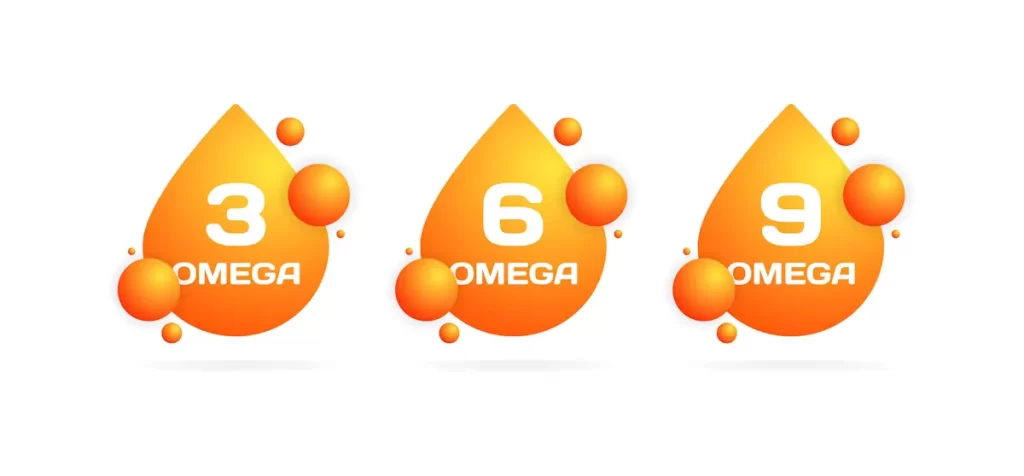Many people struggle to find the right fats for a healthy diet. Omega-9 fatty acids, a type of monounsaturated fat, can help improve heart health and reduce inflammation. This article will explain what omega-9s are, their benefits, and where to find them in foods or supplements.
Thank you for reading this post, don't forget to subscribe!Keep reading—you’ll learn how these fats fit into your lifestyle!
Key Takeaways
- Omega-9 fatty acids are monounsaturated fats that support heart health, reduce inflammation, and improve insulin sensitivity. The body can produce them naturally.
- Key sources include olive oil, avocado oil, almonds, cashews, sunflower oil, and safflower oil. Olive oil contains about 83 grams of omega-9 per 100 grams.
- Studies show omega-9s lower LDL (“bad”) cholesterol while raising HDL (“good”) cholesterol. They may also help manage type 2 diabetes by improving blood sugar control.
- The Mediterranean diet is rich in omega-9 foods like olive oil and avocados. It’s linked to lower risks of heart disease and better metabolic health.
- Though supplements exist for omega-9s, most people meet their needs through food sources like nuts or oils without requiring additional intake.
Overview of Omega-9 Fatty Acids
Omega-9 fatty acids are a type of monounsaturated fat. They occur naturally in many foods and support overall health.
Definition and Characteristics
Omega-9 fatty acids are monounsaturated fats found in plant oils and animal fat. They include oleic acid and erucic acid. The body can produce them, making these fats non-essential in the diet.
These fatty acids have one double bond located nine carbons from the methyl end of their carbon chain.
Oleic acid is a key component of olive oil, often linked to heart health benefits. Erucic acid appears mainly in oils like mustard or rapeseed oil but is less common in Western diets.
These fats help replace saturated fats, improving cholesterol levels and reducing heart disease risk.
Monounsaturated fats like omega-9s play a vital role by supporting overall wellness.
Differences Between Omega-3, Omega-6, and Omega-9
From understanding the definition and characteristics of omega fatty acids, it’s clear that different types serve unique roles in our bodies. Here’s a simple comparison of Omega-3, Omega-6, and Omega-9 fatty acids to highlight their differences:
| Aspect | Omega-3 | Omega-6 | Omega-9 |
|---|---|---|---|
| Type | Polyunsaturated fat (PUFA) | Polyunsaturated fat (PUFA) | Monounsaturated fat (MUFA) |
| Essential? | Yes – must be obtained through diet | Yes – must be obtained through diet | No – body can produce it |
| Main Benefits | Supports heart health, brain function, and reduces inflammation | Helps with brain function and supports skin and bone health | Promotes heart health and improves insulin sensitivity |
| Food Sources | Fatty fish, flaxseeds, walnuts | Vegetable oils (corn, soybean), processed foods | Olive oil, avocados, almonds |
| Excess Consumption Risks | Rare, but may cause blood thinning | Can increase inflammation if consumed in excess | Low risk |
| Ideal Ratio in Diet | High intake | Balanced with Omega-3 | No strict ratio required |
Omega-3 is required for heart health and brain function. It is found in fatty fish or flaxseed. Omega-6 is essential too and common in vegetable oils. Omega-9, though nonessential, boosts heart health. Each plays a distinct role—balancing intake is key.
Key Benefits of Omega-9 Fatty Acids
Omega-9 fatty acids offer many perks for your body. They support overall health and play a big role in keeping you well.
Enhances Heart Health
Oleic acid, found in omega-9 fatty acids, boosts heart health. It helps lower LDL cholesterol, which clogs arteries and raises the risk of heart attacks and strokes. At the same time, it increases HDL cholesterol, also known as “good” cholesterol.
This balance reduces the chance of cardiovascular disease.
Extra virgin olive oil is a top source of oleic acid and supports overall heart function. Studies show that it can reduce inflammation by lowering pro-inflammatory cytokines and C-reactive proteins.
Diets rich in this type of fat promote better blood flow and less oxidative stress on your body.
A healthy diet with monounsaturated fats like oleic acid greatly lowers cardiac risks, says researchers from cardiovascular studies.
### Supports Inflammatory Response
Supports Inflammatory Response
Omega-9 fatty acids, including oleic acid, help reduce inflammation. They lower pro-inflammatory cytokines—molecules that cause swelling and pain in the body. These effects may benefit conditions like sepsis and ulcerative colitis.
Erucic acid and mead acid also show anti-inflammatory properties. Oleic acid specifically helps decrease liver inflammation, protecting it from damage. This powerful trait links omega-9 fats to better overall health.
Improves Insulin Sensitivity
Including more omega-9 fatty acids, like oleic acid, may help improve insulin sensitivity. These fats enhance insulin signaling pathways in the body. They also reduce inflammation, which plays a role in blood sugar control.
Replacing saturated fats with healthier options like olive oil or almond oil can support better metabolic health.
The Mediterranean diet is an excellent example of this approach. It’s rich in foods high in omega-9s—like olive oil and avocado—which promote stable blood sugar levels. Studies link such diets to improved insulin function and lower risk factors for type 2 diabetes.
This simple change makes a big difference for overall health.

Potential Roles in Cancer Management
Omega-9 fatty acids, especially oleic acid, show promise in fighting cancer. Oleic acid can block breast cancer cells from spreading and growing. It also activates tumor suppressor genes, which help stop harmful cells from multiplying.
This process promotes apoptosis—natural cell death—in various types of tumors.
Mead acid may aid in treating bowel lesions and mammary carcinoma. Its anti-inflammatory effects could benefit people with these conditions. Research is still expanding to uncover more uses for omega-9s in managing cancer effectively….
Natural Sources of Omega-9 Fatty Acids
Omega-9 fatty acids are in many everyday foods—some might already be in your kitchen. Keep reading to learn how to add them to your meals!
Olive Oil
Olive oil is packed with omega-9 fatty acids, especially oleic acid. It contains about 83 grams of omega-9 per 100 grams, making it a top source for these monounsaturated fats. This is why olive oil plays a key role in the Mediterranean diet—a lifestyle linked to lower risks of heart disease and some cancers.
Oleic acid in olive oil has powerful anti-inflammatory properties. Studies suggest it may help during severe conditions like sepsis by reducing harmful inflammation. Regular use of olive oil can also support overall cardiovascular health and improve cholesterol levels.
Avocado Oil
Both olive oil and avocado oil are top sources of healthy fats. Avocado oil stands out for its high omega-9 content, especially oleic acid. It contains about 60 grams of omega-9 per 100 grams—making it a powerhouse for heart health and lowering bad cholesterol levels.
The anti-inflammatory effects of avocado oil can help reduce swelling in the body. Its benefits also include faster wound healing by promoting closure and cutting down on infections.
Use it in cooking or drizzle over salads to add a creamy flavor while boosting your intake of monounsaturated fats.
Almonds and Cashews
Avocado oil isn’t the only tasty source of omega-9 fatty acids. Almonds and cashews pack a punch, too! Almonds boast a whopping 30 grams of omega-9 per 100 grams, while cashews deliver 24 grams for the same amount.
Oleic acid, the key omega-9 found in these nuts, supports heart health and reduces inflammation.
Snacking on almonds or cashews is an easy way to boost your healthy fats. Toss them into salads, blend them into smoothies, or enjoy them raw. These nuts aren’t just flavorful; they’re also filling—perfect for maintaining energy throughout the day while benefiting your heart and overall wellness.
Sunflower and Safflower Oil
Sunflower and safflower oils are rich in omega-9 fatty acids, mainly oleic acid. Both provide about 83 grams of omega-9 per 100 grams, making them excellent sources for cooking or salad dressings.
Replacing saturated fats with these oils can boost heart health and lower LDL cholesterol levels. Diets high in oleic acid from these seed oils often positively affect overall health.

Omega-9 Fatty Acids in a Healthy Diet
Omega-9 fatty acids play a big role in balanced diets. They can support heart health and help manage cholesterol levels.
Recommended Intake Levels
There are no set recommended intake levels for omega-9 fatty acids. This is because the body can produce them when needed. Experts agree a diet rich in monounsaturated fats, like oleic acid found in olive oil and avocado oil, supports overall health.
Most people meet their needs through foods like almonds, sunflower oil, and cashews. It’s best to focus on eating whole foods high in healthy fats rather than relying on supplements.
This helps balance your dietary fat while improving heart health and reducing inflammation naturally.
Tips for Incorporating Omega-9 Rich Foods
Omega-9 fatty acids are good for your health. Adding them to your diet can be simple and tasty.
- Cook with olive oil. It is rich in omega-9 and great for frying, roasting, or drizzling on salads. Use it instead of butter or margarine for better heart health.
- Add avocado oil to meals. This healthy oil works well in dressings, marinades, and stir-fries. It boosts omega-9 intake while adding a mild flavor.
- Snack on almonds and cashews. These nuts are easy to carry and packed with omega-9s. Enjoy them as a midday snack or add them to cereal or yogurt.
- Use sunflower or safflower oils for cooking. They are perfect when baking, sautéing, or making sauces and dressings.
- Mix avocado slices into meals. Eat them on toast, include them in sandwiches, or toss them into salads to enjoy their creamy taste and healthy fats.
- Sprinkle seeds like sunflower seeds on dishes. They complement soups, salads, and even baked goods for an extra nutrient boost.
- Choose almond butter over regular spreads. Spread it on bread or fruit slices for a delicious way to increase your omega-9s.
- Prepare fish using olive oil marinade for grilling or baking dishes high in both monounsaturated fats and protein.

Omega-9 Supplements
Omega-9 supplements can help fill gaps in diets low in healthy fats. They may support heart health, reduce inflammation, and improve overall well-being.
When to Consider Supplementation
Some people may need omega-9 supplements if their body struggles to produce enough on its own. This can happen due to specific health conditions, age, or dietary gaps in monounsaturated fats.
Individuals managing chronic inflammation or dealing with insulin resistance might benefit from a boost in omega-9 fatty acids.
Those with type 2 diabetes could also consider supplementation for better blood sugar control. Future studies may even confirm its use in medical treatments. Consult a doctor first to decide if it’s right for your needs.
Choosing the Right Omega-9 Supplement
Picking the right supplement can be helpful if your diet lacks Omega-9 fatty acids. Choose wisely to ensure you meet your health needs.
- Check the source of the supplement. Look for natural ingredients like olive oil, avocado oil, or almond oil. These provide good-quality monounsaturated fats.
- Read the label carefully. Avoid supplements with added trans fats or unnecessary fillers. A simple formula with pure Omega-9 is better.
- Look for certifications on the product. Opt for brands tested by trusted groups like USP or NSF to ensure safety and quality.
- Consider your dietary restrictions. If you follow a plant-based diet, avoid supplements made with animal-derived oils.
- Pick a format that works best for you. Supplements come in forms like capsules, soft gels, and liquid oils.
- Check dosage recommendations from professionals. Too much fat intake might increase calorie counts instead of benefiting health.
- Understand your budget before buying supplements regularly—some high-end products may offer little added value compared to affordable options.
- Consult a doctor if unsure about using supplements alongside existing medications or conditions such as heart disease or diabetes.
Comparing Omega-3, Omega-6, and Omega-9
Omega-3, Omega-6, and Omega-9 fatty acids each play unique roles in health. Understanding their differences can help you balance them better in your diet.
Health Impacts of Each Type
Omega-3 fatty acids play a key role in reducing triglyceride levels and lowering heart failure risks. They also enhance brain health, making them vital for cognitive function. Found in fish oil, oily fish like salmon, and nuts, these essential fats cannot be made by the body.
High intake of omega-6 fatty acids may cause inflammation when unbalanced. Still, they support skin health and may help prevent heart disease when consumed moderately. Omega-9 fats, found in olive oil or avocado oil, lower bad cholesterol (LDL) while raising good cholesterol (HDL).
These monounsaturated fats improve insulin sensitivity and reduce heart attack risk too!
Ideal Ratios in Diet
Most Americans consume omega-6 fatty acids at a ratio of 10:1 compared to omega-3. This imbalance can impact heart health and inflammation control. Experts suggest an ideal ratio should be less than 5:1 for better results.
The Western diet is already high in omega-6 from sources like soybean oil and processed foods, making extra intake unnecessary.
A healthier balance comes by increasing your omega-3 levels. Fatty fish like salmon, mackerel, or sardines are great options—try eating them twice weekly. Adding walnuts or flaxseeds can also help boost alpha-linolenic acid (ALA), a type of omega-3 fatty acid essential for the body’s needs.

Research Insights on Omega-9 Fatty Acids
Scientists continue to study how omega-9 fatty acids influence heart health and inflammation. Early findings also show potential links between these fats and better blood sugar control.
Latest Studies on Health Benefits
Recent findings highlight omega-9 fatty acids’ role in reducing inflammation and oxidative stress. Oleic acid, a key component, has been shown to lower liver inflammation and help manage sepsis.
These benefits make it crucial for metabolic health.
Research also links omega-9 fatty acids with improved gut health. Studies suggest oleic acid can ease intestinal inflammation in conditions like ulcerative colitis. Its ability to enhance insulin sensitivity further supports its importance for overall well-being.
Ongoing Research Directions
Scientists study omega-9 fatty acids for their anti-inflammatory and anti-cancer effects. Oleic acid, a key monounsaturated fat in olive oil, shows promise as an anti-tumor agent. Research links it to possible benefits against breast and colorectal cancers.
Studies also explore its role in managing type 2 diabetes by improving insulin resistance.
Additional research examines omega-9’s effect on ulcerative colitis and wound healing. Findings suggest oleic acid aids epithelial cells’ recovery, speeding up repair processes. These studies highlight its potential to support chronic conditions and promote overall health.
FAQs About Omega-9 Fatty Acids
Many people ask about how omega-9 fatty acids work and why they matter. Here, we answer common questions to help clear confusion and guide healthy choices.
Common Questions and Expert Answers
Some wonder if omega-9 fatty acids are necessary. They are not because the body can produce them. Eating foods like olive oil or avocado oil increases omega-9 intake naturally.
Others ask how much to consume daily. There isn’t a strict guideline, but balancing fats is important. Prioritize monounsaturated fats from sources like almonds or cashews while reducing saturated fats.
Conclusion
Omega-9 fatty acids play a big role in health. They support the heart, fight inflammation, and help balance your diet. Rich oils like olive and avocado make it easy to enjoy their benefits daily.
Adding these fats can improve your lifestyle without much effort. Healthy choices today lead to better health tomorrow!
